This week saw the Blitz continue with heavy German raids on British cities: London, Portsmouth, Southampton and Merseyside were all attacked. On Sunday 15 September the Luftwaffe launched a massive raid on London which was repulsed by the RAF, with 60 German planes shot down for the loss of 26 British. The heavy losses the Luftwaffe were sustaining led Hitler to finally cancel the planned invasion of Britain, and 15 September is the date that has been chosen to mark Battle of Britain Day. Also this week, Italian forces invaded Egypt.
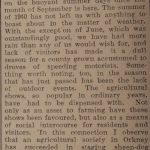 The John o’Groat Journal looked back on the disappointing summer tourist season (“With the exception of June, which was outstandingly good, we have had more rain than any of us would wish for”). As well as fewer tourists, the year had also seen a “lack of outdoor events”, noting that the agricultural shows had been dispensed with: “Summer outings have also been greatly reduced in number, thanks mainly to the petrol shortage”
The John o’Groat Journal looked back on the disappointing summer tourist season (“With the exception of June, which was outstandingly good, we have had more rain than any of us would wish for”). As well as fewer tourists, the year had also seen a “lack of outdoor events”, noting that the agricultural shows had been dispensed with: “Summer outings have also been greatly reduced in number, thanks mainly to the petrol shortage”
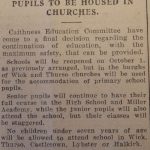
In Caithness, the Council finally decided to reopen schools on 1 October, and so put an end to the long summer holiday. But churches would be used to teach primary school children in Wick and Thurso, and no children under seven would be allowed to attend school in Wick, Thurso, Castletown, Lybster or Halkirk.
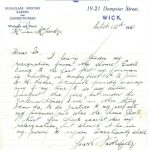 A number of men who had volunteered for the Home Guard at the start of the war were having to resign now, usually because they ran small businesses whose workers were being called up. In this letter William Taylor, proprietor of E. Campbell & Co. of Wick, grocers, bakers and confectioners, wrote to Captain M’Hardy to resign, “owing to the fact that my foreman is reporting on Monday first 16th to join H.M. Forces”.
A number of men who had volunteered for the Home Guard at the start of the war were having to resign now, usually because they ran small businesses whose workers were being called up. In this letter William Taylor, proprietor of E. Campbell & Co. of Wick, grocers, bakers and confectioners, wrote to Captain M’Hardy to resign, “owing to the fact that my foreman is reporting on Monday first 16th to join H.M. Forces”.
Thurso Burgh Council received a report on its water supply this week. The supply from Loch 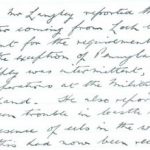 Calder was described as “sufficient” (“with the exception of Pennyland Farm where the supply was intermittent, no doubt owing to the operations at the Military Camp”). More worryingly, “there had been trouble in Castle Street caused by the presence of eels in the water pipe, but that this had now been rectified”.
Calder was described as “sufficient” (“with the exception of Pennyland Farm where the supply was intermittent, no doubt owing to the operations at the Military Camp”). More worryingly, “there had been trouble in Castle Street caused by the presence of eels in the water pipe, but that this had now been rectified”.
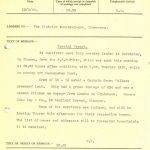 Rescued merchant seamen continued to arrive in Caithness, though not all of their ships were sunk by enemy action. On 12 September the police recorded, “14 survivors were this morning landed at Scrabster, by Thurso, from the S.S. EMPORAR, which was sunk this morning at 02.20 hours after colliding with H.M.S. Trawler SAON, while in convoy off Duncansby Head”.
Rescued merchant seamen continued to arrive in Caithness, though not all of their ships were sunk by enemy action. On 12 September the police recorded, “14 survivors were this morning landed at Scrabster, by Thurso, from the S.S. EMPORAR, which was sunk this morning at 02.20 hours after colliding with H.M.S. Trawler SAON, while in convoy off Duncansby Head”.
Finally, the Home Guard also received a helpful clarification about anti-tank mines this week: 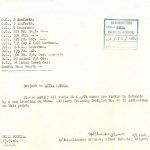 “Please notify all ranks that [Anti-Tank] mines are liable to detonate by a man treading on them. Military Training Pamphlet No. 40 is misleading on this point.”
“Please notify all ranks that [Anti-Tank] mines are liable to detonate by a man treading on them. Military Training Pamphlet No. 40 is misleading on this point.”
